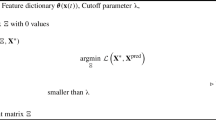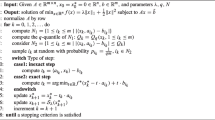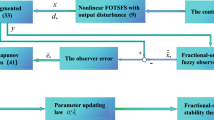Abstract
In networked system identification, how to effectively use communication resources and improve convergence speed is the focus of attention. However, there is an inherent contradiction between the two tasks. In this paper, the event-driven communication is used to save communication resources for the identification of finite impulse response systems, and the input design is carried out to meet the requirements of convergence speed. First, a difference-driven communication is proposed. Then, the performance of the communication mechanism is analyzed, and the calculation method of its communication rate is given. After that, according to the communication rate and the convergence rate of the identification algorithm, the input design problem is transformed into a constrained optimization problem, and the algorithm for finding the optimal solution is given. In addition, considering the case that the output is quantized by multiple thresholds, the way to calculate its communication rate is given and the influence of threshold number on communication rate is discussed. Finally, the effectiveness of the algorithm is verified by simulation.







Similar content being viewed by others
Data availability
No data was used for the research described in the paper.
References
Pan, J., Wang, J., & Gu, J. (2015). Study on the development strategy of high performance intelligent manufacturing in China. Heat Treatment of Metals, 40(1), 1–6.
Diao, J., Guo, J., & Sun, C. Y. (2018). Event-triggered identification of fir systems with binary-valued output observations. Automatica, 98, 95–102.
Zhou, J., Zhou, Y. H., Wang, B. C., & Zang, J. Y. (2019). Human-cyber-physical systems (hcpss) in the context of new-generation intelligent manufacturing. Engineering, 5(4), 13.
Zhou, Y., Zhao, D., & Liu, Z. Y. (2022). Development practice and breakthrough path of China’s intelligent manufacturing. Strategic Study of Chinese Academy of Engineering, 24(2), 48–55.
Guo, J., & Diao, J. (2020). Prediction-based event-triggered identification of quantized input fir systems with quantized output observations. Science China Information Sciences, 63(1), 136–147.
Wang, L. Y., & Zhao, W. X. (2013). System identification: New paradigms, challenges, and opportunities. Acta Automatica Sinica, 39(7), 933–942.
Zhang, D.Y., Wang, P., Qu, Y.L., & Fang, L.S. (2022). Research on intelligent manufacturing system of sustainable development. In the 2019 2nd World conference on mechanical engineering and intelligent manufacturing (WCMEIM), Shanghai, China, pp. 657–660.
Shan, S. Q., Wen, X., Wei, Y. G., Wang, Z. J., & Chen, Y. (2020). Intelligent manufacturing in industry 4.0: A case study of sany heavy industry. Systems Research and Behavioral Science, 37(4), 679–690.
Manufacturing, G., Zhou, J., Li, P. G., Zhou, Y. H., & Zang, J. Y. (2018). Intelligent manufacturing development strategy in China. Chinese Journal of Engineering Science, 20(4), 1–9.
Mayr, S., Grabmair, G., & Reger, J. (2017). Input design and online system identification based on Poisson moment functions for system outputs with quantization noise. In the 2017 25th Mediterranean conference on control and automation (MED), Valletta, Malta, pp. 3–6.
Li, L. W., Wang, F. X., Zhang, H. L., & Ren, X. M. (2020). A novel recursive learning estimation algorithm of wiener systems with quantized observations. ISA Transactions, 112, 23–24.
Sui, S., Chen, C. L. P., Tong, S. C., & Feng, S. (2020). Finite-time adaptive quantized control of stochastic nonlinear systems with input quantization: A broad learning system based identification method. IEEE Transactions on Industrial Electronics, 67(10), 8555–8565.
Zhao, K., Lei, T., Lin, T., & Chen, L. (2020). Robust adaptive fault-tolerant quantized control of nonlinear systems with constraints on system behaviors and states. International Journal of Robust and Nonlinear Control, 30(8), 3215–3233.
Colinet, E., & Juillard, J. (2010). A weighted least-squares approach to parameter estimation problems based on binary measurements. IEEE Transactions on Automatic Control, 55(1), 148–152.
Risuleo, R. S., Bottegal, G., & Hjalmarsson, H. (2020). Identification of linear models from quantized data: A midpoint-projection approach. IEEE Transactions on Automatic Control, 65(7), 2801–2813.
Hu, W., Liu, L., & Feng, G. (2017). Consensus of linear multi-agent systems by distributed event-triggered strategy. IEEE Transactions on Cybernetics, 46(1), 148–157.
Zhang, X., & Han, Q. (2017). Event-triggered \(H_{\infty }\) control for a class of nonlinear networked control systems using novel integral inequalities. International Journal of Robust and Nonlinear Control, 27(4), 679–700.
Liu, D., Hu, A. H., & Shao, H. Y. (2017). Adaptive event-triggered control for consensus of multi-agent systems. Computer Engineering and Applications, 53(1), 44–48.
Chen, X., & Hao, F. (2015). Event-triggered consensus control of second-order multi-agent system. Asian Journal of Control: Affiliated with ACPA, the Asian Control Professors’ Association, 17(2), 592–603.
Fu, A., & Mazo, M. (2016). Periodic asynchronous event-triggered control. In the 2016 IEEE 55th conference on decision and control (CDC), Las Vegas, NV, USA, pp. 1370–1375.
Guo, J., & Zhao, Y. L. (2013). Recursive projection algorithm on fir system identification with binary-valued observations. Automatica, 49(11), 3396–3401.
Guo, J., & Zhao, Y. L. (2014). Identification of the gain system with quantized observations and bounded persistent excitations. Science China Information Sciences, 57, 012205:1–012205:15.
Guo, J., Wang, L. Y., Yin, G., Zhao, Y. L., & Zhang, J. F. (2015). Asymptotically efficient identification of fir systems with quantized observations and general quantized inputs. Automatica, 57, 113–122.
Guo, J., & Diao, J. D. (2019). Event-Triggered Identifcation of Systems with Quantized Observations. Beijing: Metallurgical Industry Press.
Wang, L. Y., Yin, G., Zhang, J. F., & Zhao, Y. L. (2006). System Identifcation with Quantized Observations. Boston: Birkhaeuser.
Wang, L. Y., & Yin, G. (2007). Asymptotically efficient parameter estimation using quantized output observations. Automatica, 43(7), 1178–1191.
Chen, S. (2003). Martingale methods in actuarial mathematics. Mathematical Theory and Application, 23(3), 12–17.
Cheng, Y. P., Zhang, K. Y., & Xu, Z. (2006). Matrix Theory (3rd ed.). Fremont: Northwestern Polytechnical University Press.
Author information
Authors and Affiliations
Corresponding author
Additional information
This research was supported in part by the National Natural Science Foundation of China (No. 62173030) and in part by the Beijing Natural Science Foundation (No. 4222050).
Rights and permissions
Springer Nature or its licensor (e.g. a society or other partner) holds exclusive rights to this article under a publishing agreement with the author(s) or other rightsholder(s); author self-archiving of the accepted manuscript version of this article is solely governed by the terms of such publishing agreement and applicable law.
About this article
Cite this article
Liang, D., Jia, R., Jing, F. et al. Identification of FIR systems under difference-driven scheduled quantized observations. Control Theory Technol. 22, 163–172 (2024). https://doi.org/10.1007/s11768-023-00149-8
Received:
Revised:
Accepted:
Published:
Issue Date:
DOI: https://doi.org/10.1007/s11768-023-00149-8




